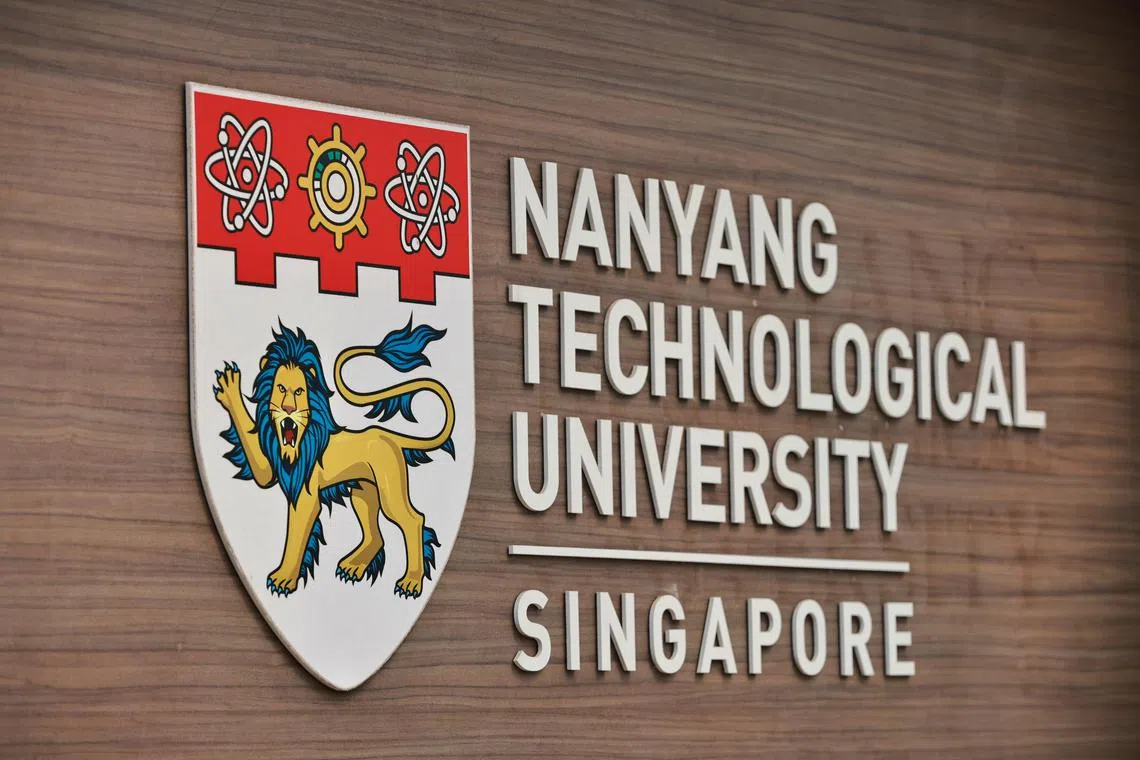Deep-tech firms spun off from NTU research worth $820m collectively
Sign up now: Get ST's newsletters delivered to your inbox

NTU has spun off 70 deep-tech firms since 2015 in sectors such as healthcare, robotics and artificial intelligence.
ST PHOTO: JASON QUAH
SINGAPORE – The pioneering research that local firm ACM Biolabs is undertaking with mRNA vaccines attests to the huge economic gains such ground-breaking companies can bring to Singapore.
ACM Biolabs is just one of 70 deep-tech firms spun off from Nanyang Technological University (NTU) research since 2015,
Take the work of ACM Biolabs, whose research aims to make for more stable mRNA vaccines that can be stored in typical refrigerators, unlike the minus 80 deg C cold needed to transport and store some Covid-19 mRNA vaccines during the pandemic.
It is trying to achieve this by developing a way to contain the mRNA in polymer to deliver to the cells, rather than with the tiny lipid particles used now, said chief executive and founder Madhavan Nallani on Thursday.
Dr Nallani added: “Our delivery is not limited to just mRNA vaccines. This could become an essential component for many therapeutics that can target different organs within the human body.”
The company’s research was highlighted at Thursday’s inaugural technology roadshow by NTUitive, an NTU business incubator.
Over 60 firms, comprising both the spin-offs linked to NTU’s intellectual property and other start-ups, showcased their advances to the public and prospective investors at the university’s Jurong West campus.
Underscoring the need for Singapore to press on in its efforts to attract and nurture such firms, Minister of State for Trade and Industry Low Yen Ling noted: “Our regional competitors are growing their ecosystems.
“Hence, competition for talent and start-ups has intensified as countries worldwide recognise that start-ups are pivotal drivers of economic growth and jobs.”
Deep-tech companies, in particular, will need targeted schemes and sustained support from an ecosystem of partners due to the longer gestation time for the innovations they rely on, with NTUitive being one such partner, she said.
Ms Low, who is also Minister of State for Culture, Community and Youth, noted the range of initiatives already in place from various players to drive growth in entrepreneurship.
Enterprise Singapore, for example, regularly runs Deal Fridays, a series of themed pitching sessions to give early-stage start-ups opportunities to present their ideas to investors.
Over 50 start-ups in sectors ranging from space technology to property technology and food technology have presented pitches in these sessions this year, Ms Low added.
Professor Louis Phee, NTU’s vice-president for innovation and entrepreneurship, said the roadshow will help the university generate more economic and social impact for Singapore by showcasing successful ventures, as well as research innovations available for companies to license.
The event is part of a broader push from the university since March to nurture innovation, accelerate research commercialisation and groom an entrepreneurial spirit within the NTU community.
NTU said it filed 518 technology inventions and disclosures and licensed over 140 of them – up 40 per cent from five years ago.
It has licensed more than 800 intellectual properties, including patents, to companies over the last decade.
Aside from the 70 spin-offs, NTUitive has also successfully incubated 260 start-ups since 2015.
NTU said these start-ups are usually founded by students and alumni with a good business idea that usually may not involve intellectual property developed by the university, unlike the spin-offs.
Another spin-off featured at the roadshow was Mindsigns Health, which developed a way to analyse electroencephalogram waveforms for patients with epilepsy or life-threatening neural conditions.
Doctors can securely access and monitor these waveforms, which represent brain activity changes, in real time to follow patients’ recovery progress remotely.
Antibody company DotBio is no less ambitious, aiming to allow numerous antibody molecules to be rapidly developed in parallel for testing as potential cancer treatments.
Said chief executive Ignacio Asial at the roadshow: “The process is similar to what the Housing and Development Board has done for housing in Singapore. Instead of building one building at a time, they prefabricate the components beforehand and stockpile them for future assembly into different final building structures.”
The firm, launched as an NTU spin-off in 2018, has secured US$10 million (S$13.6 million) in funding from partnering pharmaceutical firms, investors and grants.
“With the securing of our latest investment... we have passed the most challenging phase of company creation and establishment, and we are gearing up for our growth phase,” Dr Asial added.
Correction note: This article has been edited to reflect the correct name of ACM Biolabs.


